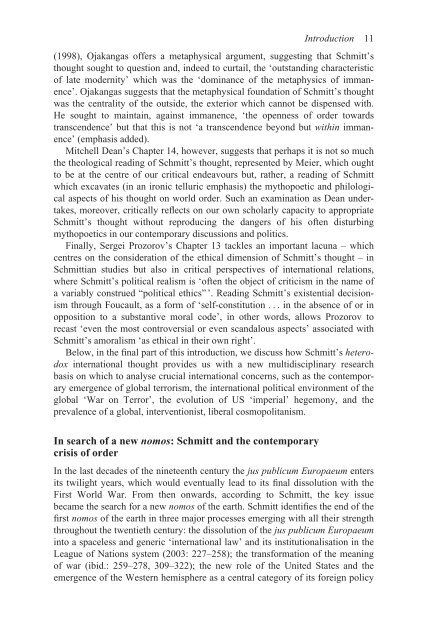The International Political Thought of Carl Schmitt: Terror, Liberal ...
The International Political Thought of Carl Schmitt: Terror, Liberal ...
The International Political Thought of Carl Schmitt: Terror, Liberal ...
You also want an ePaper? Increase the reach of your titles
YUMPU automatically turns print PDFs into web optimized ePapers that Google loves.
(1998), Ojakangas <strong>of</strong>fers a metaphysical argument, suggesting that <strong>Schmitt</strong>’s<br />
thought sought to question and, indeed to curtail, the ‘outstanding characteristic<br />
<strong>of</strong> late modernity’ which was the ‘dominance <strong>of</strong> the metaphysics <strong>of</strong> immanence’.<br />
Ojakangas suggests that the metaphysical foundation <strong>of</strong> <strong>Schmitt</strong>’s thought<br />
was the centrality <strong>of</strong> the outside, the exterior which cannot be dispensed with.<br />
He sought to maintain, against immanence, ‘the openness <strong>of</strong> order towards<br />
transcendence’ but that this is not ‘a transcendence beyond but within immanence’<br />
(emphasis added).<br />
Mitchell Dean’s Chapter 14, however, suggests that perhaps it is not so much<br />
the theological reading <strong>of</strong> <strong>Schmitt</strong>’s thought, represented by Meier, which ought<br />
to be at the centre <strong>of</strong> our critical endeavours but, rather, a reading <strong>of</strong> <strong>Schmitt</strong><br />
which excavates (in an ironic telluric emphasis) the mythopoetic and philological<br />
aspects <strong>of</strong> his thought on world order. Such an examination as Dean undertakes,<br />
moreover, critically reflects on our own scholarly capacity to appropriate<br />
<strong>Schmitt</strong>’s thought without reproducing the dangers <strong>of</strong> his <strong>of</strong>ten disturbing<br />
mythopoetics in our contemporary discussions and politics.<br />
Finally, Sergei Prozorov’s Chapter 13 tackles an important lacuna – which<br />
centres on the consideration <strong>of</strong> the ethical dimension <strong>of</strong> <strong>Schmitt</strong>’s thought – in<br />
<strong>Schmitt</strong>ian studies but also in critical perspectives <strong>of</strong> international relations,<br />
where <strong>Schmitt</strong>’s political realism is ‘<strong>of</strong>ten the object <strong>of</strong> criticism in the name <strong>of</strong><br />
a variably construed “political ethics” ’. Reading <strong>Schmitt</strong>’s existential decisionism<br />
through Foucault, as a form <strong>of</strong> ‘self-constitution . . . in the absence <strong>of</strong> or in<br />
opposition to a substantive moral code’, in other words, allows Prozorov to<br />
recast ‘even the most controversial or even scandalous aspects’ associated with<br />
<strong>Schmitt</strong>’s amoralism ‘as ethical in their own right’.<br />
Below, in the final part <strong>of</strong> this introduction, we discuss how <strong>Schmitt</strong>’s heterodox<br />
international thought provides us with a new multidisciplinary research<br />
basis on which to analyse crucial international concerns, such as the contemporary<br />
emergence <strong>of</strong> global terrorism, the international political environment <strong>of</strong> the<br />
global ‘War on <strong>Terror</strong>’, the evolution <strong>of</strong> US ‘imperial’ hegemony, and the<br />
prevalence <strong>of</strong> a global, interventionist, liberal cosmopolitanism.<br />
In search <strong>of</strong> a new nomos: <strong>Schmitt</strong> and the contemporary<br />
crisis <strong>of</strong> order<br />
Introduction 11<br />
In the last decades <strong>of</strong> the nineteenth century the jus publicum Europaeum enters<br />
its twilight years, which would eventually lead to its final dissolution with the<br />
First World War. From then onwards, according to <strong>Schmitt</strong>, the key issue<br />
became the search for a new nomos <strong>of</strong> the earth. <strong>Schmitt</strong> identifies the end <strong>of</strong> the<br />
first nomos <strong>of</strong> the earth in three major processes emerging with all their strength<br />
throughout the twentieth century: the dissolution <strong>of</strong> the jus publicum Europaeum<br />
into a spaceless and generic ‘international law’ and its institutionalisation in the<br />
League <strong>of</strong> Nations system (2003: 227–258); the transformation <strong>of</strong> the meaning<br />
<strong>of</strong> war (ibid.: 259–278, 309–322); the new role <strong>of</strong> the United States and the<br />
emergence <strong>of</strong> the Western hemisphere as a central category <strong>of</strong> its foreign policy
















